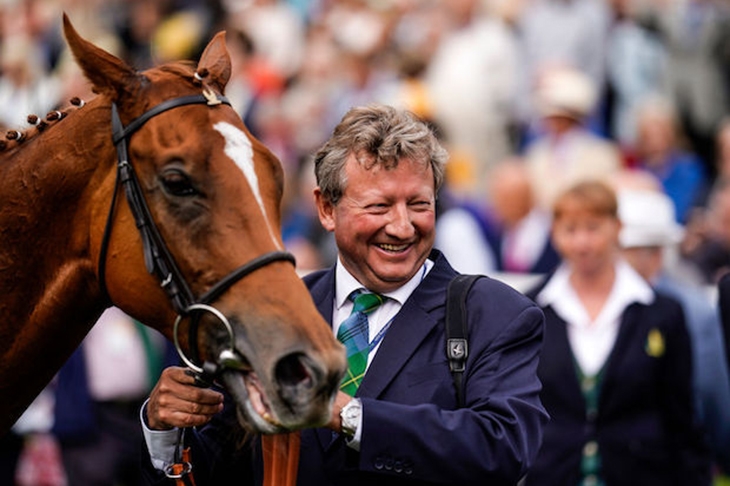Fairy tales can happen. On Sunday the filly God Given won Italy’s only Group One race of the season, the Premio Lydia Tesio, providing Newmarket trainer Luca Cumani with his 50th Group One winner. Just days before he had moved many of his staff to tears by announcing that on 1 December he will retire and sell the Bedford House Stables where he has operated for 43 years, sending out two Derby winners in Kahyasi (1988) and High Rise (1998) and winning a host of big races around the world. Only Sir Mark Prescott and Sir Michael Stoute have run Newmarket yards for longer and there has been no doubting the genuineness of the tributes paid by the whole racing community to the elegant and highly astute English-domiciled Italian.
Sometimes his style has seemed more English than the English. When an owner once complained about a jockey not moving his Cumani-trained horse into a gap to seize a race, Luca famously countered: ‘I think you will find that the gap was travelling rather faster than your horse.’ But my favourite Cumani story is one he used to tell himself of the well-known racing writer who phoned him and failed to get the information he sought. The disgruntled journo then phoned a colleague and opened the conversation without waiting to hear who was on the line: ‘Guess what that lying wop has just told me…’ Unfortunately, he had repeat-dialled the previous number and the voice that replied was that of Cumani himself, saying: ‘Michael, this is that lying wop.’
In some ways, Cumani defies the national stereotype. Having taken on and tutored the 14-year-old Frankie Dettori, he once told an interviewer: ‘I’m emotional, but Frankie does it just right and it goes better with his image. Tears and leaping around looks great on him but it would look rather odd on me.’ Not only did he mentor Frankie, he also helped launch the champion apprentice careers of Jimmy Fortune and Jason Weaver. Typically, he was one of the first to help Kieren Fallon get going again after a shocking shoulder injury threatened to wreck his career. What all his jockeys will tell you is that Luca’s success is based on being kind to his horses, showing the patience necessary to let them develop. His achievements have not been down to some mystical affinity with the horse but are about careful observation, a card-index memory and meticulous preparation.
Cumani’s career is studded with Classic victories and the international successes of horses like Barathea in the 1994 Breeders Cup, and Tolomeo, the first English-trained horse to win a million-dollar race in America in the 1983 Arlington Million. My favourite was the mighty Falbrav, winner of five Group Ones in 2003 concluding in Hong Kong. Early on, however, Luca won a reputation as a supreme handicap specialist. Sometimes those three words are code for a trainer who knows how to under-prepare or stop a horse enough times to earn a low handicap mark without provoking the attention of the authorities. Not so with Luca Cumani. He once declared that cheating would have been too easy. ‘I need a challenge and stopping a horse three times is not a challenge.’ The way to win handicaps, he maintains, is not by concealing a horse’s ability but by improving horses to keep them ahead of the handicapper. Horses naturally improve from three to four and from four to five provided they haven’t been soured. The canny Cumani did, though, spot early on that the bigger trainers tended to start their best horses at Ascot, Sandown or Goodwood, their middle rankers at tracks such as Redcar and Leicester and their not-much-hopers at more remote tracks in the north. The handicappers tended then to rank horses as much by venue as by their performance and so Luca would occasionally send a swan or two among the ducks to Carlisle or Hamilton and so have them handicapped favourably. Intriguingly, though he carried off some successful handicap coups for his owners, Luca does not bet.
What is not forgotten by the racing community is Luca Cumani’s grace and determination in the face of setbacks that would have sunk others for good. In the 1990s he had expanded Bedford House and was training for Sheikh Mohammed when the Sheikh decided to set up his own Godolphin operation and took a host of good horses away. In 2000 the Aga Khan, who had owned Kayhasi, removed his bluebloods from the stable after a dispute, and more recently Sheikh Mohammed Obaid Al Maktoum took his high-powered string away from Bedford House, seemingly because he had wanted a horse to run in a race for which the trainer felt he was not ready. Every time Luca managed to rebuild and to find more quality animals to do the business. But now that he is down to some 40 horses he feels he cannot compete at the level he would wish to and instead he will concentrate on his Fittocks Stud breeding operation. We will miss him.






Comments